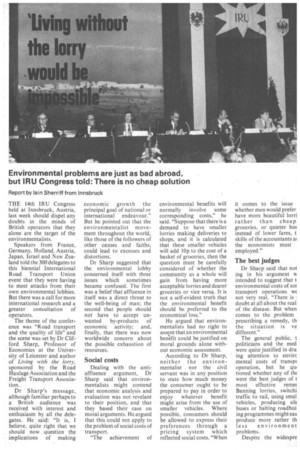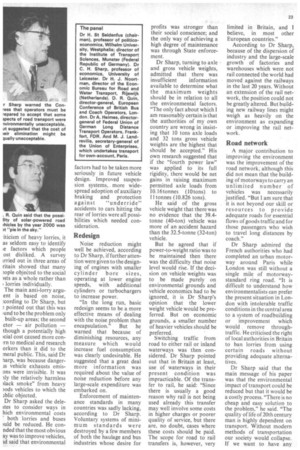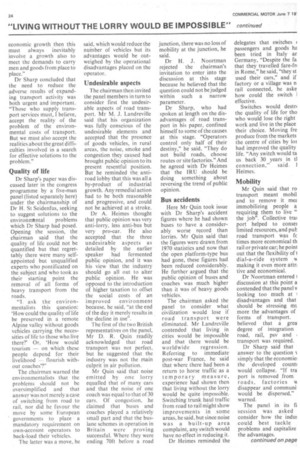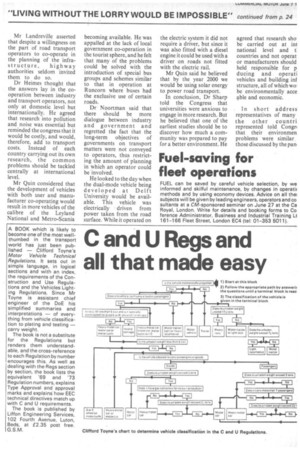Report by lain Sherriff from Innsbruck
Page 24

Page 25

Page 26

Page 32

If you've noticed an error in this article please click here to report it so we can fix it.
• THE 14th IRU Congress held at Innsbruck, Austria, last week should dispel any doubts in the minds of British operators that they alone are the target of the environmentalists.
Speakers from France, Germany, Holland, Austria, Japan, Israel and New Zealand told the 300 delegates to this biennial International Road Transport Union event that they were having to meet attacks from their own environmental lobbies. But there was a call for more international research and a greater consultation of operators.
The theme of the conference was "Road transport and the quality of life" and the scene was set by Dr Clifford Sharp, Professor of Economics at the University of Leicester and author of Living with the lorry, sponsored by the Road Haulage Association and the Freight Transport Association.
Dr Sharp's message, although familiar perhaps to a British audience was received with interest and enthusiasm by all the delegates. He said: "It is, I believe, quite right that we should now question the implications of making economic growth the principal goal of national or international endeavour." But he pointed out that the environmentalist movement throughout the world, like those of the followers of other causes and faiths, could lead to excesses and distortions.
Dr Sharp suggested that the environmental lobby concerned itself with three issues which sometimes became confused. The first was a belief that affluence in itself was a direct threat to the well-being of man; the second that people should not have to accept unwanted by-products of economic activity; and, finally, that there was now worldwide concern about the possible exhaustion of resources.
Social costs
Dealing with the antiaffluence argument, Dr Sharp said that environmentalists might contend that economic analysis and evaluation was not revelant to their position, and that they based their case on moral arguments. He argued that this could not apply to the problem of social costs of transport.
"The achievement of environmental benefits will normally involve some corresponding costs," he said. "Suppose that there is a demand to have smaller lorries making deliveries to shops, and it is calculated that these smaller vehicles will add 10p to the cost of a basket of groceries, then the question must be carefully considered of whether the community as a whole will gain from having more acceptable lorries and dearer groceries or vice versa. It is not a self-evident truth that the environmental benefit should be preferred to the economical loss."
He argued that environmentalists had no right to assent that an environmental benefit could be justified on moral grounds alone without economic assessment.
According to Dr Sharp, neither the environmentalist . nor the civil servant was in any position to state how much money the consumer ought to be prepared to pay in order to enjoy whatever benefit might arise from the use of smaller vehicles. Where possible, consumers should be allowed to express their preferences through a pricing system which reflected social costs. "When it comes to the issue whether men would prefer have more beautiful lorri rather than cheap groceries, or quieter bus instead of lower fares, t skills of the accountants al the economists must employed."
The best judges
Dr Sharp said that not ing in his argument vo intended to suggest that t environmental costs of sot transport operations we not very real. "There is doubt at all about the real of the disease. But when comes to the problem prescribing a remedy, th the situation is ve different."
The general public, t politicians and the med were quite justified in dra ing attention to envire mental costs of transp( operation, but he qu1 tioned whether any of tht were the best judges of I most effective reme( Banning lorries, switchi traffic to rail, using smal vehicles, producing silt buses or halting roadbui ing programmes might eas produce more rather th less environment problems.
Despite the widespre iticism of heavy lorries, it as seldom easy to identify le factors which people ost disliked. A survey irried out in three areas of ritain showed that many ople objected to the social ists as a whole rather than lorries individually.
The main anti-lorry arguent is based on noise, :cording to Dr Sharp, but ! pointed out that this was ,und to be the problem only built-up areas; the second ctor — air pollution — though a potentially high 'dal cost caused more conTri to medical and research orkers than it did to the :neral public. This, said Dr aarp, was because dangeris vehicle exhausts emisons were invisible. It was ly the relatively harmless )Iack smoke" from heavy )(ids vehicles to which the Mlle objected.
Dr Sharp asked the deleites to consider ways in hich environmental costs both lorries and buses ruld be reduced. He connded that the most obvious ay was to improve vehicles, id said that environmental factors had to be taken more seriously in future vehicle design. Improved suspension systems, more widespread adoption of auxiliary braking and protection against "underride" accidents to cars hitting the rear of lorries were all possibilities which needed consideration.
Redesign
Noise reduction might well be achieved, according to Dr Sharp, if further attention were given to the designing of engines with smaller cylinder bore sizes, operating at lower engine speeds, with additional cylinders or turbochargers to increase power.
"In the long run, basic redesign seems to be a more effective means of dealing with the noise problem than encapsulation." But he warned that because of diminishing resources, any measure which would increase fuel consumption was clearly undesirable. He suggested that a great deal more information was required about the value of noise reduction before any large-scale expenditure was embarked on.
Enforcement of maintenance standards in many countries was sadly lacking, according to Dr Sharp. Voluntary systems of minimum standards were destroyed by a few members of both the haulage and bus industries whose desire for profits was stronger than their social conscience; and the only way of achieving a high degree of maintenance was through State enforcement.
Dr Sharp, turning to axle and gross vehicle weights, admitted that there was insufficient information available to determine what the maximum weights should be in relation to all the environmental factors. "The only fact about which I am reasonably certain is that the authorities of my own country are wrong in insisting that 10 tons axle loads and 32 tons gross vehicle weights are the highest that should be accepted." His own research suggested that if the "fourth power law" was applied to its full rigidity, there would be net gains in raising maximum permitted axle loads from 10.16 tonnes (10tons) to 11 tonnes (10.826 tons).
He said of the gross vehicle weight that there was no evidence that the 39.4tonne (40-ton) vehicle was more of an accident hazard than the 32.5-tonne (32-ton) vehicle.
But he agreed that if power-to-weight ratio was to be maintained then there was the difficulty that noise level would rise. If the decision on vehicle weights was to be made purely on environmental grounds and vehicle economics had to be ignored, it is Dr Sharp's opinion that the lower weight vehicle would be preferred. But on economic grounds, a smaller number of heavier vehicles should be preferred. Switching traffic from road to either rail or inland waterways was then considered. Dr Sharp pointed out that in Britain at least, use of waterways in their present condition was impracticable. Of the transfer to rail, he said: "Since there is usually a good reason why rail is not being used already this transfer may well involve some costs in higher charges or poorer quality of service, but there are, no doubt, cases where these costs should be paid. The scope for road to rail transfers is, however, very limited in Britain, and I believe, in most other European countries."
According to Dr Sharp, because of the dispersion of industry and the large-scale growth of factories and warehouses which were not rail connected the world had moved against the railways in the last 20 years. Without an extension of the rail network, the position could not be greatly altered. But building new railway lines might weigh as heavily on the environment as expanding or improving the rail network.
Road network
A major contribution to improving the environment was the improvement of the road network, although this did not mean that the building of motorways to carry an unlimited number of vehicles was necessarily justified. "But I am sure that it is not beyond our skill or resources to provide adequate roads for essential flows of goods traffic and for those passengers who wish to travel long distances by coach."
Dr Sharp admired the French authorities who had completed an urban motorway around Paris while London was still without a single mile of motorwaystandard ring road. "It is difficult to understand how environmentalists can prefer the present situation in London with intolerable traffic conditions in the central area to a system of roadbuilding or improvement which would remove throughtraffic. He criticised the right of local authorities in Britain to ban lorries from using certain roads without providing adequate alternatives.
Dr Sharp said that the main message of his paper was that the environmental impact of transport could be reduced but that it would be a costly process. "There is no cheap and easy solution to the problem," he said. "The quality of life of 20th century man is highly dependent on transport. Without modern methods of transportation our society would collapse. If we want to have any economic growth then this must always inevitably involve a growth also to meet the demands to carry men and goods from place to place."
Dr Sharp concluded that the need to reduce the adverse results of expanding transport activity was both urgent and important. "Those who supply transport services must, I believe, accept the reality of the problem of the environmental costs of transport. But we must also accept the realities about the great difficulties involved in a search for effective solutions to the problem."
Quality of life
Dr Sharp's paper was discussed later in the congress programme by a five-man panel (listed separately here) under the chairmanship of Dr H. St Seidenfus, seeking to suggest solutions to the environmental problems which Dr Sharp had posed. Opening the session, the chairman said that the quality of life could not be quantified but that regrettably there were many selfappointed but unqualified experts who pontificated on the subject and who took as their starting point the removal of all forms of heavy transport from the roads.
"I ask the environmentalists this question: 'How could the quality of life be preserved in a remote Alpine valley without goods vehicles carrying the necessities of life to those who live there?' Or, 'How would tourism — on which these people depend for their livelihood -flourish without coaches'?"
The chairman warned the environmentalists that the problems should not he oversimplified and that answer was not merely a case of switching from road to rail, nor did he favour the move by some European governments to place a mandatory requirement on own-account operators to back-load their vehicles.
The latter was a move, he said, which would reduce the number of vehicles but its advantages would be outweighed by the operational disadvantages placed on the operator.
Undesirable aspects
The chairman then invited the panel members in turn to consider first the undesirable aspects of road transport. Mr M. J. Landreville said that his organization was fully conscious of the undesirable elements and accepted that the presence of goods vehicles, in rural areas, the noise, smoke and congestion they caused had brought public opinion to its present resentful position. But he reminded the, antiroad lobby that this was all a by-product of industrial growth. Any remedial action had to be both reasonable and progressive, and could not be achieved at a stroke.
Dr A. Heimes thought that public opinion was very anti-lorry, less anti-bus but very pro-car. He also accepted that the three undesirable aspects as detailed by the earlier speaker had fermented public opinion, and it was his view that the industry should go all out to alter public opinion. He was opposed to the introduction of higher taxation to offset the social costs of an improved environment because, he said, "at the end of the day it merely results in the decline in use".
The first of the two British representatives on the panel, Mr D. R. Quin readily acknowledged that road transport was not perfect, but he suggested that the industry was not the main culprit in air pollution.
Mr Quin said that noise emitted by one lorry equalled that of many cars and that the noise of one coach was equal to that of 30 cars. Of congestion, he claimed that buses and coaches played a relatively small part and that the buslane schemes in operation in Britain were proving successful. Where they were ending 70ft before a road junction, there was no loss of mobility at the junction, he said.
Dr H. J. Noortman rejected the chairman's invitation to enter into the discussion at this stage because he believed that the question could not be judged within such a narrow parameter.
Dr Sharp, who had spoken at length on the disadvantages of road transport in his paper, confined himself to some of the causes at this stage. "Operators control only half of their destiny," he said. "They do not build roads, choose routes or site factories." And he agreed with Dr Heimes that the IRU should be doing something about reversing the trend of public opinion.
Bus accidents
Here Mr Quin took issue with Dr Sharp's accident figures where he had shown buses to have a considerably worse record than lorries. Mr Quin said that the figures were drawn from 1970 statistics and now that the open platform-type bus had gone, these figures had been reduced considerably. He further argued that the public opinion of buses and• coaches was much higher than it was of heavy goods vehicles.
The chairman asked the panel to consider what civilization would lose if road transport were eliminated. Mr Landreville contended that living in cities would be impossible and that there would be worldwide regression. Referring to immediate post-war France, he said that where there had been a return to horse traffic as a temporary measure, experience had shown then that living without the lorry would be quite impossible. Switching trunk haul traffic from road to rail might show improvements in some areas, he said, but since noise was a built-up area complaint, any switch would have no effect in reducing it.
Dr Heimes reminded the delegates that switches passengers and goods ha been tried in Italy ar Germany, "Despite the fa that they travelled fare-fr, in Rome," he said, "they st used their cars," and if factory or a village was n• rail connected, he aske how could the switch 1 effective.
Switches would destri the quality of life for tho who would lose the right work and live in the place their choice. Moving fre produce from the markets the centre of cities by lot had improved the quality life. "Any switch would ta us back 30 years in tl connection," said 1 Heimes.
Mobility
Mr Quin said that ro transport meant mobil and to remove it met immobilizing people a requiring them to live " the job". Collective trai port helped to consei limited resources, and pub road transport was fc times more economical th rail or private car; he point out that the flexibility oft dial-a-ride system .14 making it even more atm tive and economical.
Dr Noortman entered 1 discussion at this point a contended that the panel v looking too much at 1 disadvantages and that should be stressing mt. more the advantages of forms of transport. believed that a grea degree of integration road, rail, psv and transport was required.
Dr Sharp said that answer to the question N simply that the economie! the developed count] would collapse. "If tra port is removed from roads, factories disappear and communi would be dispersed," warned.
The panel in its fi session was asked consider how the indw .could best tackle problems and capitalize the advantages.
continued on page Mr Landreville asserted that despite a willingness on the part of road transport operators to co-operate in the planning of the infra structure, highway authorities seldom invited them to do so.
Dr Heimes thought that the answers lay in the cooperation between industry and transport operators, not only at domestic level but internationally. He agreed that research into pollution and noise was essential but reminded the congress that it would be costly, and would, therefore, add to transport costs. Instead of each country carrying out its own research, the common problems should be tackled centrally at international level.
Mr Quin considered that the development of vehicles with both user and manufacturer co-operating would result in more vehicles of the calibre of the Leyland National and Metro-Scania becoming available. He was appalled at the lack of local government co-operation in the tourist sphere, and he felt that many of the problems could be solved with the introduction of special bus groups and schemes similar to that in operation at Runcorn where buses had the exclusive use of certain roads.
Dr Noortman said that there should be more dialogue between industry and government and regretted the fact that the long-term objectives of governments on transport matters were not conveyed to operators, thus restricting the amount of planning in which an operator could be involved.
He looked to the day when the dual-mode vehicle being developed at Delft University would be available. This vehicle was electrically driven from power taken from the road surface. While it operated on the electric system it did not require a driver, but since it was also fitted with a diesel engine it could be used with a driver on roads not fitted with the electric rail.
Mr Quin said he believed that by the year 2000 we would be using solar energy to power road transport.
In conclusion, Dr Sharp told the Congress that universities were anxious to engage in more research. But he believed that one of the earliest studies should be to discover how much a community was prepared to pay for a better environment. He agreed that research sho. be carried out at int national level and t; countries and not operat or manufacturers should held responsible for p ducing and operati vehicles and building inf structure, all of which woi be environmentally acce able and economic.
In short address representatives of many the other countri represented told Congn that their environmen problems were similar those discussed by the pan,




























































































































































